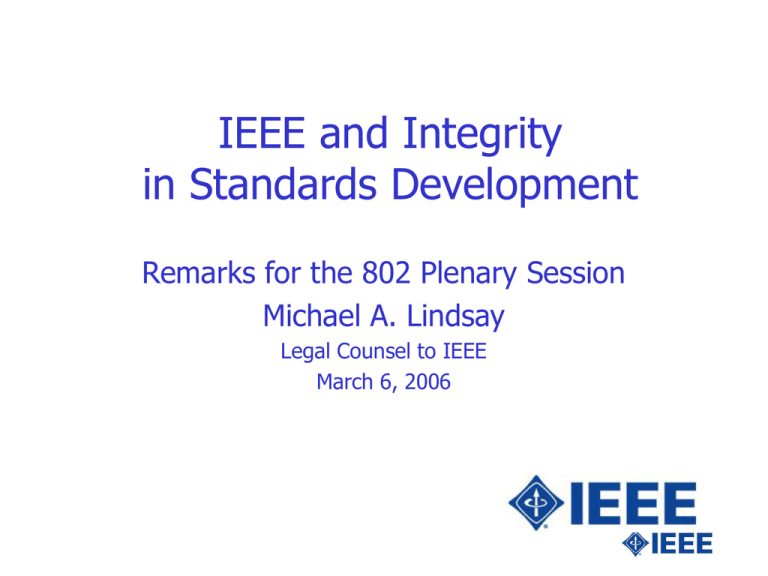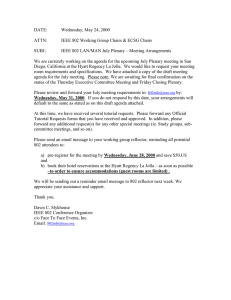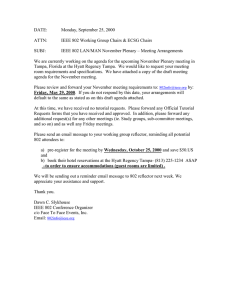IEEE and Integrity in Standards Development Remarks for the 802 Plenary Session
advertisement

IEEE and Integrity in Standards Development Remarks for the 802 Plenary Session Michael A. Lindsay Legal Counsel to IEEE March 6, 2006 Summary • • • • Review of IEEE Ethics provisions Interplay of law and ethics IEEE and Intellectual Property Indemnification Policy March 6, 2006 802 Plenary Presentation -2 Fundamentals of IEEE Process • • • • • Due process Openness Consensus Balance Right of appeal March 6, 2006 802 Plenary Presentation -3 IEEE Member Pledge • “We, the members of the IEEE, in recognition of the importance of our technologies in affecting the quality of life throughout the world, and in accepting a personal obligation to our profession, its members and the communities we serve, do hereby commit ourselves to the highest ethical and professional conduct.” IEEE Code of Ethics (available at http://www.ieee.org/portal/site/mainsite/menuitem.818c0c39e85ef176 fb2275875bac26c8/index.jsp?&pName=corp_level1&path=about/whati s&file=code.xml&xsl=generic.xsl&) March 6, 2006 802 Plenary Presentation -4 Member Pledge and Standards March 6, 2006 802 Plenary Presentation -5 Public Interest Is Paramount • “accept responsibility in making engineering decisions consistent with the safety, health and welfare of the public” • “disclose promptly factors that might endanger the public” March 6, 2006 802 Plenary Presentation -6 Ethics, Conflicts, and Disclosure • “avoid real or perceived conflicts of interest whenever possible” • “disclose [conflicts] to affected parties” • “reject bribery in all its forms” March 6, 2006 802 Plenary Presentation -7 Ethics, Standards, and Relevant Competence • “be honest and realistic in stating claims or estimates based on available data” • “undertake technological tasks for others only if qualified by training or experience, or after full disclosure of pertinent limitations” • “seek, accept, and offer honest criticism of technical work, to acknowledge and correct errors” March 6, 2006 802 Plenary Presentation -8 Ethical Behavior and the Law • members of SDOs “often have economic incentives to restrain competition” • “the product standards set by such associations have a serious potential for anticompetitive harm” Allied Tube & Conduit Corp. v. Indian Head, Inc., 486 US 492 (1988) March 6, 2006 802 Plenary Presentation -9 Examples of Behavior • “[T]he steel group voters were instructed where to sit and how and when to vote by group leaders who used walkie-talkies and hand signals to facilitate communication.” • Each participant in IEEE standards development should his or her own independent and individual judgment -- Allied Tube March 6, 2006 802 Plenary Presentation -10 Examples of Behavior, cont’d • “Few of the steel group voters had any of the technical documentation necessary to follow the meeting.” -- Allied Tube March 6, 2006 • Participants in IEEE standards development should read -- and have the education, training, and background to understand -- technical proposals 802 Plenary Presentation -11 Examples of Behavior, cont’d • “None of them spoke at the meeting to give their reasons for opposing the proposal to approve polyvinyl chloride conduit.” • Participants in IEEE standards development should come to meetings prepared, listen attentively, and actively participate -- Allied Tube March 6, 2006 802 Plenary Presentation -12 “[W]e look to see whether the process of standard-setting has been abused to seek an unfair competitive advantage and whether the proposed standard is the product of any anticompetitive conduct on the part of the organization or its members.” U.S. Justice Department – American Welding Soc’y Business Review Letter (Oct. 7, 2002) (available at http://www.usdoj.gov/atr/ public/busreview/200310.htm March 6, 2006 802 Plenary Presentation -13 The Enforcement Process • Federal investigations – E.g., FTC’s Rambus-JEDEC investigation – Interviews and depositions of participants in standards process • Private litigation March 6, 2006 802 Plenary Presentation -14 Some Specific Policies March 6, 2006 802 Plenary Presentation -15 IEEE and Essential Patents • Permits (but does not require) the known use of essential patents in standards • Requires disclosure of known patents (yours or anyone else’s) • Early disclosure encouraged – Critical to open nature of standard development • WG Chair calls for disclosure at every meeting March 6, 2006 802 Plenary Presentation -16 Letters of Assurance • Chair requests Letter of Assurance from potential IP owner – Formal request to for information concerning their patent and whether the patent holder will be willing to license that patent for use on reasonable and nondiscriminatory terms • Potential responses: – Owner has essential patents and that they'll license them on RAND terms – Owner has essential patents and won't license them them – “Owner” isn't aware of any essential patents March 6, 2006 802 Plenary Presentation -17 Copyright Policy • IEEE owns copyright of material published by IEEE, to “enhanc[e] the accessibility, distribution and use of information” and “control the use of its good name” IEEE PSPB Operations Manual 8.1.5 IEEE Copyright Policy and Procedures • IEEE policy prohibits “the reuse of someone else’s prior ideas, processes, results, or words without explicitly acknowledging the original author and source” IEEE Guidelines for Handling Plagiarism Complaints March 6, 2006 802 Plenary Presentation -18 Trademark Policy • IEEE emblem is a legally protected trademark • Can be used only in connection with official business of the IEEE • Indicates membership in the IEEE • Use of mark without permission is unlawful • Consult Guidelines IEEE Policies 12.1 - Trademark March 6, 2006 802 Plenary Presentation -19 IEEE Indemnification Policy • IEEE can indemnify participants only “to the extent permitted by law” • IEEE will indemnify if Board finds that participant’s activities “have been duly authorized” • IEEE does not indemnify if Board finds that participant’s activities “have been taken in bad faith or in a manner inconsistent with the purposes or objectives of IEEE” March 6, 2006 802 Plenary Presentation -20 Some Conclusions • IEEE – you, the members – have rightly agreed to standards of ethical behavior • The law encourages compliance with those standards • The success of the standards development process depends on compliance with ethical standards of behavior March 6, 2006 802 Plenary Presentation -21

